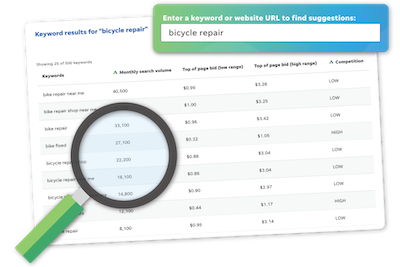Popular Keywords – SEO Keywords
Search Popular Keywords in Your Industry
These are the most popular suggestions for SEO Keywords generated by WordStream’s Free Keyword Tool. To get have all of these keywords sent to you, simply enter your Email address and click “Email Keywords” below.
Your keywords are on the way to your inbox!
SEO Tips and Tricks
Nearly everybody knows Will Ferrell’s most quotable line from Blades of Glory: “It’s provocative! It gets the people going!” What hardly anybody knows is that Ferrell’s character, Chazz Michael Michaels, was referring not to a Black Eyed Peas song, but instead to the topic of search engine optimization, otherwise known as SEO. Drop some knowledge about backlinks at a party to assert yourself as the coolest guy in the room.
But, we’re getting ahead of ourselves. We should start from the top. What is SEO?
In plain terms, SEO is all the different stuff you can do on your website to improve its position on search engine results pages (SERPs), specifically in the organic (unpaid) results. If you’re wondering why this is important, try to remember the last time you Googled something and clicked through to the second page.
So, how do you get yourself towards the middle and top of that first page? First things first: you need to understand how search engines – namely, Google – operate. The algorithm is wildly complex, but the basics are good to know.
In order to satisfy its users, Google hunts for sites and pages that contain relevant, quality information. The search engine determines relevance by crawling all the content on your site (pages, documents, images) and judging whether it pertains to the searcher’s query. That assessment is based largely on the query keyword and its prevalence on your site. Google determines quality in several ways, and one of the most crucial is how often other sites link to yours. Of course, the quality of those other sites is taken into account, too.
Google also looks at how often people click through to your site and how long they stay there. If nobody ever clicks through to your site, or if they sometimes click through and consistently bounce back to the SERP, you’re going to get buried. The speed of your site and the diversity of your content also come into play.
Now that you know, what can you do? Start with keywords. Identify your prospective customers and figure out what they’re searching. Use different keyword tools see which ones have high search volume and which ones aren’t too competitive for you to stand a chance. Then, start producing content that involves your keywords. If you write a blog about Facebook ads, you better make sure “Facebook ads” appears in your title tag, meta description, URL, body content, and image descriptions. Just don’t go overboard with it. Google isn’t dumb, you know.
When reputable websites link to a piece of your content, that page earns some clout. By knowing which pieces of your content are most popular, you can link from those pages to other pages on your site and spread the love. A surefire way to earn clout from other websites is to crank out and promote awesome content that people want to consume and share. This is where content marketing and social media become invaluable tools.
Real quick – some other important stuff. Make sure that your pages load fast and that your site is mobile-friendly. Avoid redirecting your content from one URL to another at all costs, and most certainly avoid duplicate content. It’s lazy and it makes your site look thin.
To be transparent, this SEO overview is as about as surface level as it gets. Definitely bounce over here for a more in-depth and helpful body of advice.
After that, read up on paid search and paid social on the WordStream blog.
BUSINESS KEYWORDS
- Accounting Keywords
- Affiliate Keywords
- Auto Insurance Keywords
- B2B Ecommerce Keywords
- B2B Keywords
- Biotechnology Keywords
- Business Keywords
- Business Management Keywords
- Business Travel Keywords
- Construction Keywords
- Credit Card Keywords
- Debt Keywords
- Entertainment Keywords
- Finance Keywords
- Human Resources Keywords
- Insurance Business Keywords
- Internet Security Keywords
- Management Keywords
- Office Supplies Keywords
- Online Payment Solutions Keywords
- Software Keywords
- Startup Keywords
- Web Hosting Keywords
CONSUMER KEYWORDS
- Art Keywords
- Automotive Keywords
- Casino Keywords
- Cell Phone Keywords
- Computer Keywords
- Dating Keywords
- Ecommerce Keywords
- Electronics Keywords
- Email Keywords
- Fashion Keywords
- Golf Keywords
- Hotel Keywords
- Internet Keywords
- Jobs Keywords
- Law Keywords
- Mortgage Keywords
- Music Keywords
- Online Stores Keywords
- Pest Control Keywords
- Photography Keywords
- Plumbing Keywords
- Real Estate Keywords
- Restaurants Keywords
- Shoes Keywords
- Travel Keywords
- Wedding Keywords
FINANCE KEYWORDS
HEALTH & WELLNESS KEYWORDS
MISCELLANEOUS KEYWORDS
- Aerospace Keywords
- Agriculture Keywords
- Best Travel Keywords
- Coffee Keywords
- Dog Training Keywords
- Education Keywords
- Environmental Keywords
- Food & Beverage Keywords
- Forex Keywords
- Gifts Keywords
- Home Based Business Keywords
- Home Improvements Keywords
- Internet Games Keywords
- iPhone Keywords
- Jewelry Keywords
- Landscaping Keywords
- Legal Keywords
- Luggage Keywords
- Pharmaceutical Keywords
- Poker Keywords
- Retail Keywords
- School Education Keywords
- Solar Energy Keywords
- Transporation Keywords
- Women Fashion Keywords
- Work From Home Keywords

